|
De Duitse dichter en schrijver Heinrich Peuckmann werd geboren op 15 juli 1949 in Kamen. Zie ook alle tags voor Heinrich Peuckmann op dit blog en ook mijn blog van 15 juli 2010.
Wenn überhaupt
Die Sonne schien noch
gegen Mittag, der leichte Wind
ist mild und in den Bäumen
mehr gelb als grün
Das ist jetzt deine Zeit
denkst du, Ende Oktober
wenn überhaupt, noch ein November
ein Dezember, wenn überhaupt
Die Sonne könnte wieder
scheinen, noch heute, noch
an dem einen oder andern
Tag, wenn überhaupt
Könnte das Gelb
zum Leuchten bringen, den
leichten Wind erwärmen
und dich vergessen machen
Das ist jetzt deine Zeit
Ende Oktober, noch
ein November, noch dies
noch das, wenn überhaupt
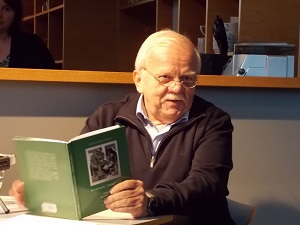
Heinrich Peuckmann (Kamen, 15 juli 1949)
De Duitse dichter, schrijver, vertaler, essayist en uitgever Robert Wohlleben werd geboren op 15 juli 1937 in Rahlstedt. Zie ook alle tags voor Robert Wohlleben op dit blog en ook mijn blog van 15 juli 2010.
Der große Heraus
Kratz Fuß, nick Kopp, begreif den Unbegriff
von hergeloffnem Untüch ohne Ahnung!
Doch zick und zack! umschifft ist schon die Lahnung
vom Anfluch, wie er sich den Eisprung schliff.
Und sei wahrschaut: Im Triebe ging das Schiff,
versank den Weg in ungebahnte Wahnung,
zerspant sich scheiternd in Geblak und Zahnung.
Sigilli logo: Alles fob und cif.
Nun sichten wir wohl Karten und Papiere
auf Mein und Dein und ganz verbrannten Schnee:
Was meint Verschleiß? Und was heißt jene Schliere?
An allen Vieren beten wir seit je
als nachgeborne Hammel nach, wie schiere
Vergärung strandet als Mouton-Cadet.
Flötenspiel
Die Gongs von Blicken, Winken, Worten dringen
durch all des wirren Tags verworrnes Klirrn,
wir gehn verirrt, bis uns die Augen flirrn,
in schrägen, nicht von uns gelegten Schlingen.
Stakkato: Voll im Dauerfeuer schwingen
die Zielgeräte ein, uns JETZT zu kirrn,
gestrichen Korn. Viel unbekannt Gestirn
strahlt auf, wo doch mal UNSRE Sterne hingen.
Dein Atem hetzt in atemlosen Sätzen
dahin, wo ich seit je gewesen bin –
doch hin ist hin, da bleiben nichts als Fetzen
von Traum und Trauer, Wut und Widersinn,
die wolln uns weitertreiben, schleifen, wetzen.
Und kleine Terzen wehen drüber hin
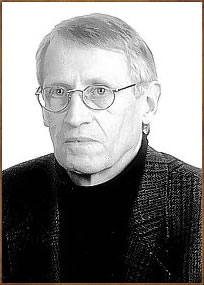
Robert Wohlleben (Rahlstedt, 15 juli 1937)
De Joods-Duitse schrijver en cultuurfilosoof Walter Benjamin werd geboren op 15 juli 1892 in Berlijn. Zie ook alle tags voor Walter Benjamin op dit blog.
Uit: Papier- und Schreibwaren
„GALANTERIEWAREN. Unvergleichliche Sprache des Totenkopfes: völlige Ausdruckslosigkeit – das Schwarz seiner Augenhöhlen – vereint er mit wildestem Ausdruck – den grinsenden Zahnreihen.
Einer, der sich verlassen glaubt, liest und es schmerzt ihn, daß die Seite, die er umschlagen will, schon aufgeschnitten ist, daß nicht einmal sie mehr ihn braucht.
Gaben müssen den Beschenkten so tief betreffen, daß er erschrickt.
Als ein geschätzter, kultivierter und eleganter Freund mir sein neues Buch übersandte, überraschte ich mich dabei, wie ich, im Begriff es zu öffnen, meine Krawatte zurecht rückte.
Wer die Umgangsformen beachtet, aber die Lüge verwirft, gleicht einem, der sich zwar modisch kleidet, aber kein Hemd auf dem Leibe trägt.
Wenn der Zigarettenrauch in der Spitze und die Tinte im Füllhalter gleich leichten Zug hätten, dann wäre ich im Arkadien meiner Schriftstellerei.
Glücklich sein heißt ohne Schrecken seiner selbst innewerden können.“
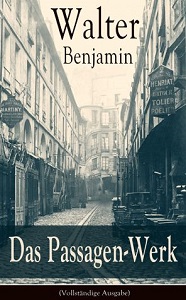
Walter Benjamin (15 juli 1892 - 27 september 1940)
Cover
De Amerikaanse schrijver Clive Cussler werd geboren in Aurora, Illinois op 15 juli 1931. Zie voor ook alle tags voor Clive Cussler op dit blog en ook mijn blog van 15 juli 2010.
Uit: Zero Hour
“Thunder shook the unlit cavern as an immense, blue-white spark jumped between a pair of towering, metal columns. Instead of fading, the shimmering charge split in two and the twin streams of plasma began to circle their respective pillars.
They moved like flames chasing the wind, racing around the columns and snaking their way upward toward the underside of a curved, metallic dome. There, they swirled together like the arms of a spiral galaxy, joining each other once again before vanishing in a final, eye-searing flash.
Darkness followed.
Ozone lingered in the air.
On the floor of the cavern, a group of men and women stood motionless, night-blind from the display. The flash hadbeen impressive, but they’d all seen electricity before. Every one of them expected something more.
"Is that it?" a gruff voice asked. The words came from Brigadier General Hal Cortland, a burly, squat figure of a man. They were directed at thirty-eightyear-old Daniel Watterson, a slight, blond-haired man wearing spectacles who stood by the controls of the great machine from which the artificial lightning had come.
Watterson studied a bank of dimly lit gauges. "I'm not actually sure," he whispered to himself. No one had ever gotten this far, not even Michael Faraday or the great Nikola Tesla. But if Watterson was right—if his calculations and his theory and years of serving as Tesla’s apprentice had led him to understand what was about to occur—then the display of light they’d just witnessed should be only the beginning.
He switched off the main power, stepped away from the controls, and pulled the wire-rimmed glasses from his face.
Despite the darkness, he could make out a soft blue glow coming from the columns. He raised his eyes to the dome above. An effervescent hue could be seen coursing around its inner surface.
“Well?” Cortland demanded.
Back at the console, one of the needles ticked up. Watterson saw it from the corner of his eye.
“No, General,” he said quietly, “I don’t think it’s quite finished.”
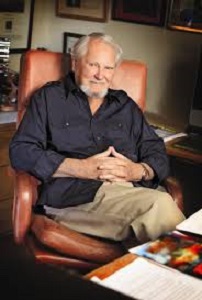
Clive Cussler (Aurora, 15 juli 1931)
De Franse literair criticus en filosoof Jacques Derrida werd geboren in El-Biar, Algerije, op 15 juli 1930. Zie ook alle tags voor Jacques Derrida op dit blog en ook mijn blog van 15 juli 2010.
Uit:A dessein, le dessin
“Le trait différentiel – on y reviendra encore tout à l'heure, je pense –, c'est, naturellement, le trait apparemment visible qui sépare deux pleins, ou deux surfaces, ou deux couleurs, mais qui, en tant que trait différentiel, est ce qui permet toute identification et toute perception. Alors, le trait différentiel, métaphoriquement, ça peut désigner aussi bien ce qui, à l'intérieur de n'importe quel système, graphique ou non, graphique au sens courant ou non, institue des différences, par exemple dans un mot, dans une phrase – c'est la linguistique saussurienne –, le trait différentiel, le trait diacritique, c'est ce qui permet d'opposer le même et l'autre, l'autre et l'autre, et de distinguer. Mais le trait en tant que tel, lui-même en tant que trait différentiel, n'existe pas, n'a pas de plein. Si vous voulez, toute la pensée ou la théorie de la trace que j'avais essayé d'élaborer sans référence essentielle au dessin – encore que, dans De la grammatologie, la question du dessin chez Rousseau fut posée aussi –, néanmoins, au-delà du dessin proprement dit, la trace, ou le trait, désignerait – c'est en tout cas ce que j'ai essayé de montrer – la différence pure, la diacriticité, ce qui fait que quelque chose peut se déterminer par opposition à autre chose : l'intervalle, l'espacement, ce qui sépare. Et alors, ce qui sépare – l'intervalle, l'espacement – en lui-même n'est rien, n'est ni intelligible ni sensible, et en tant qu'il n'est rien, il n'est pas présent, il renvoie toujours à autre chose et, par conséquent, n'étant pas présent, il ne se donne pas à voir. Au fond, la plus grande généralité de la définition du trait, telle qu'elle m'a intéressé depuis longtemps, c'est qu'au fond il donne tout à voir, mais il ne se voit pas. Il donne à voir sans se donner lui-même à voir. Et donc le rapport au trait lui-même – au trait sans épaisseur, au trait absolument pur –, le rapport au trait lui-même est un rapport, une expérience d'aveuglement. »
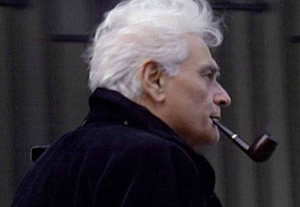
Jacques Derrida (15 juli 1930 – 8 oktober 2004)
De Britse schrijver Hammond Innes werd op 15 juli 1913 in Horsham geboren als zoon van een bankdirecteur. Zie ook alle tags voor Hammond Innes op dit blog en ook mijn blog van 15 juli 2010.
Uit: Wreckers Must Breathe
„Cornwall is a wrecker's coast. But when I left for my holiday I thought of the wrecker as a picturesque ruffian of several centuries ago who lured ships to their destruction with false beacons and waded out into the angry seas to knife the crew and unload the cargo as the vessel broke up. I did not think of Cornwall as being still a wrecker's coast, and I knew nothing of the modern wreckers I was to find havened beneath the shadow of those grim cliffs. I had intended going to the Lakes, but fate decreed that the gathering storm of the Polish crisis should keep my companion at his desk in the newsroom and that I should pick on the Lizard for my holiday. I stayed at Church Cove, where white, thatched cottages, massed with flowers, straggled down a valley to the dark cleft of the cove with the round capstan house on its shingle beach rotting because no boats came. The Kerris's cottage, where I stayed, was at the upper end of the village and backed on to a farm. The cottage was really two cottages thrown into one to make a guest house. Kerris, who had done the knocking together himself, was very proud of the result. Before I had been there half an hour he was taking me over the place, showing me with his toothless mouth agrin all the pieces he had obtained from the Clan Malcolm which had been wrecked that winter. He had relaid the floors throughout the cottage during the winter and as far as I could gather the work had all been done with wood from the Clan Malcolm. There were brass doorsteps, chairs and ship's lamps, all from the same luckless ship. He was a great wrecker, was Kerris. When I expressed my amazement at the amount of stuff he had collected from that one ship, he shook his head with a ruefill smile. 'Ar, she were a grand wreck,' he said. 'We'll never see the like o' her again, sir—never. She came ashore this side of the Lizard. Caught on the rocks, she was, and broke her back. She was no use for salvage purposes, so Lloyd's told the Cadgwith people that if they liked to go out and salvage what they could and put it up for auction in the village they might collect a percentage of the proceeds: He shook his head again. 'Ar, she were a grand wreck, sir. If we had one like that every winter, we'd not have to work: I spent five days there in a pleasant haze of bathing, lazing, pubs and Cornish cream.”
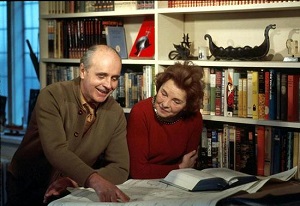
Hammond Innes (15 juli 1913 – 10 juni 1998)
Hier met echtgenote Dorothy Lange.
De Japanse dichter en schrijver Kunikida Doppo werd geboren op 15 juli 1871 in Choshi. Zie ook alle tags voor Kunikida Doppo op dit blog.
Uit: River Mist and Other Stories
“The hill, the river and the moon looked as they always had done, but he knew that some of his friends of earlier days must now lie in this graveyard where he was sitting. He felt that the river of his life had almost run its course to the sea and only a semi-transparent membrane separated him from his dear friends.”
(...)
“...there are older people, teachers for example, of whom it is insufficient merely to say that they are unforgettable. People who have helped you in some significant way, I mean. You have to admit that these people are worthy to be remembered. Since they have sworn no oath of duty or affection for you, they have no obligation to you. You are just a stranger to them, and even when, by the very nature of things, you have forgotten them, it does not mean that you are lacking in affection or sense of obligation. However, there are some people in this world that you can just never forget.”
(...)
“...it remains for me to say that Toyokichi himself was a good man. He had talent certainly, but he lacked staying-power. Or rather, he did have staying-power as such, but somewhere in the core of his being there was a weakness and he was apt to miss out on essentials. He was rather like a stick which, although struck against an object with full force, produces a dull thud rather than the clear crack you would expect. He was a good man, full of the best intentions, but he lacked courage, or perhaps it would be better to say that he lacked spirit.”

Kunikida Doppo (15 juli 1871 – 23 juni 1908)
Pagoda en stenen boeddha bij de Enpuku-jitempel in Chōshi
15-07-2017 om 10:00
geschreven door Romenu 
Tags:Robert Wohlleben, Heinrich Peuckmann, Walter Benjamin, Clive Cussler, Jacques Derrida, Hammond Innes, Kunikida Doppo, Romenu
|

